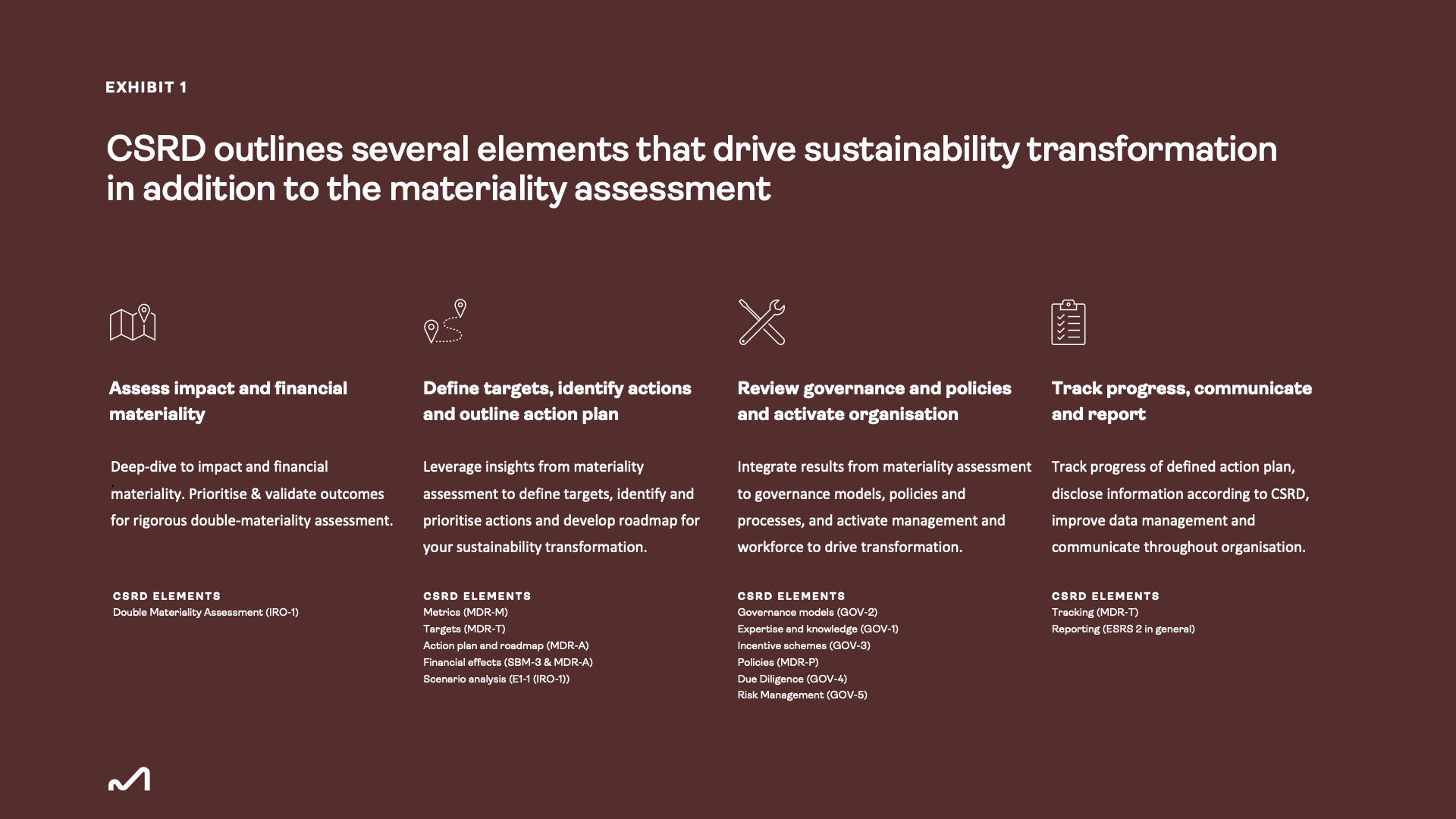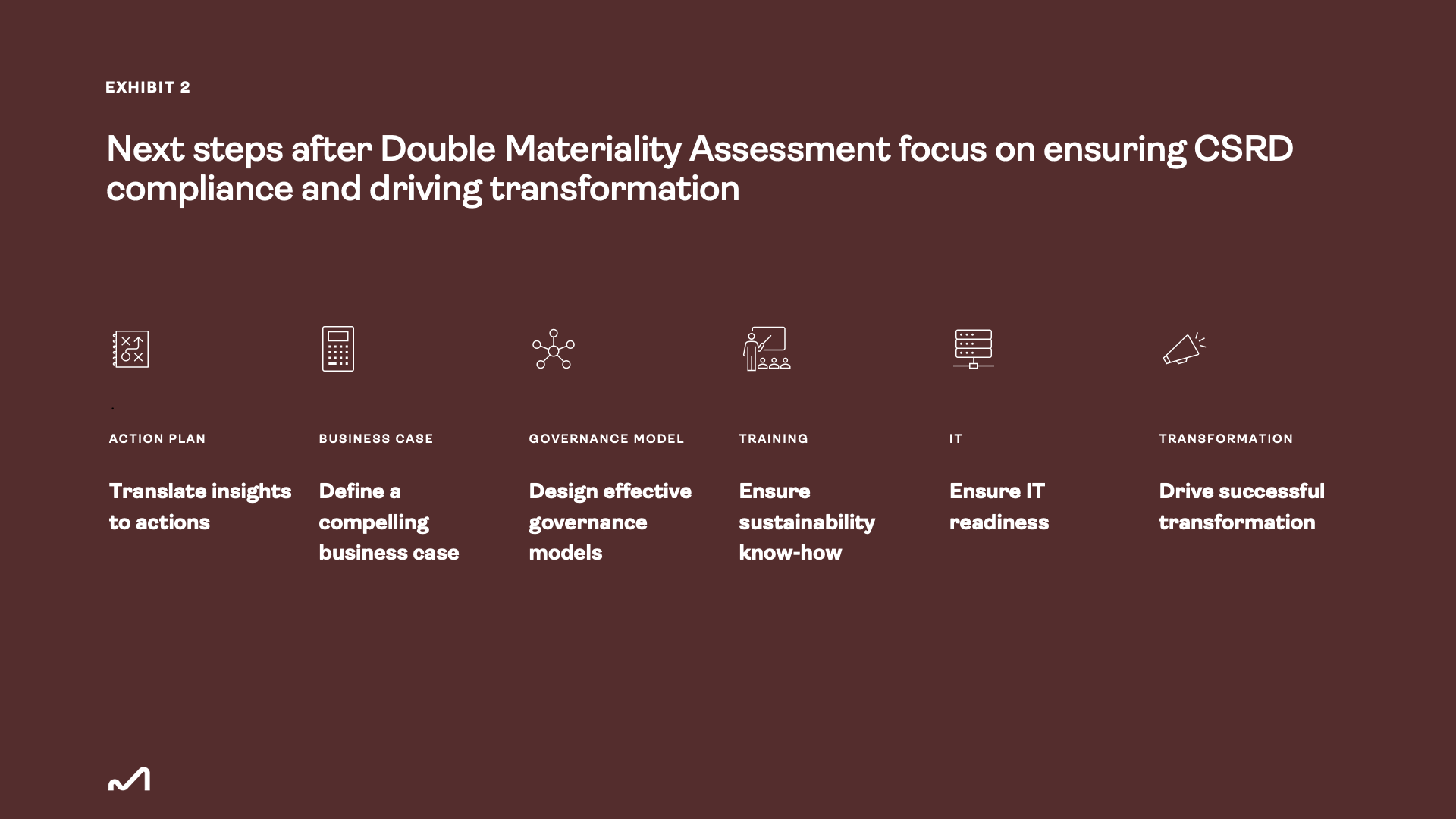9 November 2023
Beyond CSRD Double Materiality Assessments – Next Steps in Driving Sustainability Transformations
Max Knuts
Head of Strategy Practice
9 November 2023
Beyond CSRD Double Materiality Assessments – Next Steps in Driving Sustainability Transformations
Max Knuts
Head of Strategy Practice
In our previous webinar, we delved into how CSRD can be leveraged to accelerate companies' sustainability transformations and what steps companies should take after conducting their Double Materiality Assessments. This blog post serves as a recap of the key takeaways from that discussion.
To thrive in this era of significant change, companies must prepare for major business change
In an era defined by substantial change, sustainability stands as one of the defining megatrends shaping the future of business. The implications of this change are profound, fundamentally altering how companies conduct their business. To thrive in this new landscape, businesses must undergo a profound transformation.
It's important to note that change is not foreign to companies; they have continually adapted to shifts that impacted their strategies, business models, and operational capabilities. The same building blocks for successful transformation also apply to sustainability transformations. To succeed, companies must develop and implement a comprehensive transformation plan that spans the entire organization and encompasses:
- Strategy and business model
- Goals and KPIs
- Operations and processes
- Technology and tools
- Culture and identity
CSRD speaks transformation language – and CSRD can be considered a useful tool to support the sustainability transformation
Beyond its specific sustainability data reporting requirements, CSRD sheds light on elements that facilitate broader sustainability transformations, as depicted in Exhibit 1. For example, having metrics, targets and action plans in place enables companies to define a solid business plan for realizing their sustainability ambitions and following-up on their actual progress. Governance models, policies, and processes enable activating the organization and leading the transformation. Progress tracking and reporting facilitate communication with stakeholders, which is a crucial aspect of successful change management practices in business transformations.
Exhibit 1: CSRD elements driving sustainability transformation

What should then be the next steps after the Double Materiality Assessment?
With most companies having completed their Double Materiality Assessments, the focus then shifts from mere compliance to comprehensive adherence to the directive. This transition involves harnessing the insights from the Double Materiality Assessment to accelerate broader sustainability transformations. Drawing from our experience, we recommend companies to focus on key steps as outlined in Exhibit 2.
Exhibit 2: Next steps on the CSRD journey after Double Materiality Assessment

Translate insights to actions: Decode the insights from your Double Materiality Assessment, identify potential actions, prioritise them and convert them to an action plan with clear targets and KPIs.
Define a compelling business case: Ensure that you get the necessary funding to drive the sustainability transformation by defining key value drivers and developing a compelling business case.
Design effective governance models: Ensure that your organisation is ready for the transformation by incorporating sustainability into the core of your operations.
Ensure sustainability know-how: Ensure that both management and workforce have the necessary know-how to transform by designing effective training programs.
Ensure IT readiness: Ensure that the extensive IT implications of CSRD reporting, as well as your data and technology landscape, are clearly defined and prioritized in a manner that supports not only CSRD compliance but also the broader sustainability transformation.
Drive successful transformation: Instigate real change in your organisation by leveraging change management practices such as communicating about early wins and current progress against targets.
In conclusion, CSRD is a catalyst for transformation, and the insights gained from Double Materiality Assessments can power the broader sustainability journey. Forward-thinking companies stand to discover synergies by harnessing the significant investments required for CSRD compliance as a means to expedite their sustainability transformations beyond reporting compliance
Let's talk about how to make this happen
We help you set the foundation and grow into becoming true business leaders in vast sustainability transformations.
Mia Folkesson
Managing Partner
mia@impaktly.com
Let's talk about how to make this happen
We help you set the foundation and grow into becoming true business leaders in vast sustainability transformations.
Mia Folkesson
Managing Partner
mia@impaktly.com